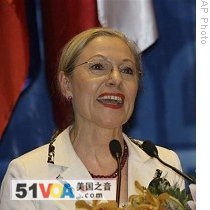Bangkok
25 May 2009
The European Union is urging Burma to immediately release democracy leader Aung San Suu Kyi and other political prisoners. European and Asian foreign ministers are meeting in Hanoi this week to discuss cooperation on a range of issues. EU leaders are also asking Asian countries to push Burma towards democratic reform.
The Asia-Europe meeting brings together representatives of more than 40 nations to discuss cooperation between the regions.
Economic cooperation was expected to be at the top of the agenda, but the imminent sentencing of Nobel Peace Prize winner Aung San Suu Kyi has made her trial a timely concern.
 |
| Benita Ferrero-Waldner, EU commissioner for external relations, speaks during the opening ceremony of ASEM FMs' Meeting in Hanoi, Vietnam, 25 May 2009 |
"I will most probably, in the form of a troika, see the Foreign Minister of Myanmar now in Hanoi," she said. "It is in principle for seeing, so you can imagine that we will pass on very clearly our message and that is of course a release of all prisoners and foremost also Aung San Suu Kyi, and not using any pretexts to have her in prison any longer."
Despite growing pressure to release her, Burma's military government appears determined to keep Aung San Suu Kyi locked up.
Thailand, which holds the rotating chair of the Association of Southeast Asian Nations, last week issued a statement expressing "grave concern" about her treatment.
The statement said the trial put Burma's "honor and credibility" on the line and was the strongest ASEAN comment to date against Burma.
Ferrero-Waldner says the European Union wants to see more pressure on Burma.
"I think it is the most important, therefore I appeal to all the neighboring countries that the neighboring countries particularly, commit themselves to engage with this government in such a way that there be changes, because China, India and of course ASEAN [Association of Southeast Asian Nations] countries, they are the real neighbors here," said Benita Ferrero-Waldner. "They work with the country, and therefore they have the best influence."
Burma's military government has rejected all criticism of the trial.
Aung San Suu Kyi has been kept under house arrest for 13 of the past 19 years and is on trial for violating the terms of her arrest.
Earlier this month, she allowed an American man who snuck into her house to stay for two days without official permission.
The man, John Yettaw, and two of Aung San Suu Kyi's aids are also on trial.
The charges are widely seen as an excuse to keep the Nobel Peace Prize winner locked up through next year's elections.
Her National League for Democracy Party won Burma's last elections in 1990, but the military never let them take power.
If Aung San Suu Kyi is found guilty, she could be imprisoned for up to five years along with the more than 2,000 other political prisoners in Burma.